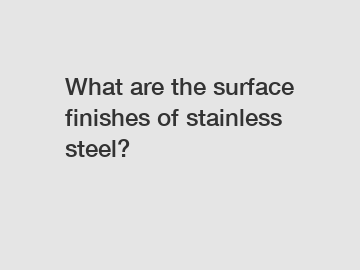What are the surface finishes of stainless steel?
Stainless steel is a versatile and durable material that is commonly used in a wide range of industries and applications. One of the key features of stainless steel is its ability to resist corrosion, making it an ideal choice for environments where exposure to moisture or chemicals is common. However, in order to maximize its performance and appearance, stainless steel often requires surface finishes.
Surface finishes are applied to stainless steel to improve its aesthetics, durability, and resistance to corrosion. There are several different types of surface finishes available for stainless steel, each with its own unique properties and benefits. In this blog post, we will explore some of the most common surface finishes used for stainless steel and discuss the advantages of each.
1. Mill Finish: The most basic surface finish for stainless steel is the mill finish, which is obtained by leaving the steel in its original state after it has been manufactured. This finish has a dull appearance and is not particularly attractive, but it is cost-effective and can be easily cleaned. Mill finish stainless steel is commonly used in applications where aesthetics are not a primary concern, such as industrial machinery or equipment.

2. Brushed Finish: A brushed finish is achieved by brushing the surface of the stainless steel with abrasive materials, such as sandpaper or wire brushes. This process creates a distinctive pattern of fine lines or "grain" on the surface of the steel, giving it a textured appearance. Brushed finishes are popular for applications where a more polished look is desired, such as in architectural or decorative applications.
3. Mirror Finish: A mirror finish is the most polished and reflective surface finish available for stainless steel. This finish is achieved by buffing the surface of the steel with polishing compounds until it reaches a high level of shine and reflectivity. Mirror finishes are often used in high-end applications, such as in the automotive or food processing industries, where a clean and shiny appearance is important.
4. Satin Finish: A satin finish is a smooth and uniform surface finish that falls between a brushed finish and a mirror finish in terms of reflectivity. This finish is achieved by gently sanding the surface of the stainless steel with fine abrasive materials, resulting in a soft and muted appearance. Satin finishes are commonly used in architectural or interior design applications, where a modern and sophisticated look is desired.
5. Bead Blasted Finish: A bead blasted finish is achieved by blasting the surface of the stainless steel with small glass beads at high pressure, creating a textured and matte appearance. This finish is often used in applications where a non-reflective surface is required, such as in electronic or scientific equipment.
6. PVD Coating: PVD (Physical Vapor Deposition) coating is a process where a thin layer of metal or metal oxide is applied to the surface of the stainless steel using a vacuum deposition process. This coating can be in a variety of colors and finishes, such as gold, rose gold, or black, and provides additional protection against corrosion and wear. PVD coatings are commonly used in architectural or jewelry applications for their aesthetic appeal.
In conclusion, the surface finish of stainless steel plays a crucial role in enhancing its appearance, durability, and performance. By choosing the right surface finish for your specific application, you can ensure that your stainless steel will look great and perform well for years to come. Whether you prefer a brushed, mirror, satin, or bead blasted finish, there is a surface finish option available to suit your needs and preferences. Choose wisely and enjoy the benefits of high-quality stainless steel in your projects.
Contact us to discuss your requirements of Rose Gold Sandblasted Stainless Steel Plate, SS Roofing Sheet supplier, Ti-Blue Hairline stainless steel sheets. Our experienced sales team can help you identify the options that best suit your needs.


